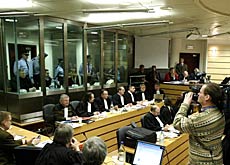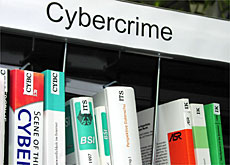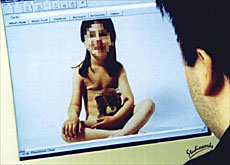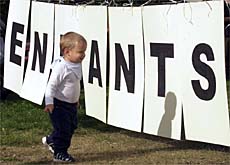Lessons of Dutroux affair still to be learnt

Convicted child rapist Marc Dutroux has gone on trial in Belgium on charges of kidnapping and abusing six girls in the 1990s and murdering four of them.
The events spurred Switzerland and other European nations to step up the fight against paedophile crime. But campaigners say much remains to be done.
Dutroux was arrested in 1996. Eight years on hundreds of journalists have descended on the town of Arlon to report on the trial.
The case caused a public outcry amid revelations of inept police work and led to huge demonstrations in Belgium.
Protests of a similar nature have also taken place elsewhere in Europe. In 2002 thousands of protesters took to the streets of Switzerland to demand more action to protect children from sexual abuse.
In 2001 a special unit was created within the Federal Police Office to deal with paedophile crime and coordinate investigations between cantons and with other countries.
The unit was supplemented early last year by a national cybercrime office to combat internet crime, including child pornography.
Three cantons – Geneva, Vaud and Bern – have also set up their own cybercrime offices to investigate paedophile activities on the internet.
Tackling crime
Some observers, however, say the Swiss authorities could do more to tackle paedophile crime.
“There has been no major improvement in the fight against paedophilia on the internet since the Dutroux affair,” Pascal Seeger, the former head of canton Geneva’s cybercrime unit, told swissinfo.
Seeger, who left the police to work for the anti-paedophile non-governmental organisation, Action Innocence, argues that not enough resources are available to fight sexual abuse of children.
“The laws don’t give us enough latitude to arrest paedophiles or to punish them,” he said.
He also expressed concern that the Swiss government’s planned budget cuts would make it more difficult to track down paedophiles.
But Philippe Kronig, who heads up the Swiss Coordination Unit for Cybercrime Control, disagrees with this assessment.
“We are able to handle the same workload that other countries deal with,” he said.
Monitoring websites
Kronig’s eight-strong team monitors suspicious websites by copying their contents on to their own systems. They then check them for links or references to Switzerland and determine whether their authors could be legally prosecuted.
But the unit is not supported across the country. Canton Zurich has declined to contribute financially, arguing that the bureau is too small to make a difference.
Critics also warn that any nationally-coordinated action is hindered by Switzerland’s federal structure, which leaves responsibility for dealing with paedophile crime to individual cantons.
“We can only take over some tasks if the cantons specifically ask for them,” said federal police spokesman Guido Balmer.
“But most of them prefer to rely on their own resources and knowledge.”
Seeger argues that the issue is more complex and points out that the cantons and federal authorities cannot always decide who is ultimately responsible.
“It’s unfortunate because Germany and France have both made progress by creating systems which work at a regional, national and international level,” he said.
Positive results
Coordinated police operations over the past two years have led to investigations into more than 1,000 suspected child pornographers in Switzerland – including local officials, civil servants and teachers.
Earlier this year the Swiss Conference of Cantonal Directors of Public Education produced a blacklist of suspected paedophile teachers in a bid to prevent anyone convicted of child sex offences from finding new employment by moving to a school in a different canton.
Gabriela Fuchs, the conference’s spokeswoman, said the aim of the list was not to name people specifically.
“We don’t give out names,” she told swissinfo. “The cantons will only get a ‘yes’ or ‘no’ answer if someone is blacklisted.”
The Catholic Church has also begun to deal with paedophile priests within its ranks and says it is prepared to hand offenders over to the courts.
“If they are found guilty, they will have to go to prison like everybody else,” said Marc Aellen, spokesman for the Swiss Bishops Conference.
swissinfo, Scott Capper
June 24, 1995: two eight-year-old girls are kidnapped in Liège.
August 22, 1995: two teenage girls disappear in Oostende.
May 28, 1996: Sabine Dardenne, 12, is kidnapped near Tournai.
August 9, 1996: Laetitia Delhez, 14, is abducted in Bertrix.
August 13, 1996: Marc Dutroux, his wife Michelle Martin and Michel Lelièvre are arrested.
August 15, 1996: Laetitia and Sabine are found alive near Charleroi after Dutroux gives police their whereabouts.
August 17, 1996: the bodies of two of other girls are found at Dutroux’s home.
October 17, 1996: a Belgian parliamentary commission is set up.
October 20, 1996: more than 300,000 people attend an anti-paedophile protest in Brussels.
April 15, 1997: the parliamentary commission report highlights police and judicial failings.
January 20, 2002: Dutroux, who tried to escape in 1998, speaks for the first time of a “paedophile network”.
March 1, 2004: the Dutroux trial begins.

In compliance with the JTI standards
More: SWI swissinfo.ch certified by the Journalism Trust Initiative



You can find an overview of ongoing debates with our journalists here . Please join us!
If you want to start a conversation about a topic raised in this article or want to report factual errors, email us at english@swissinfo.ch.